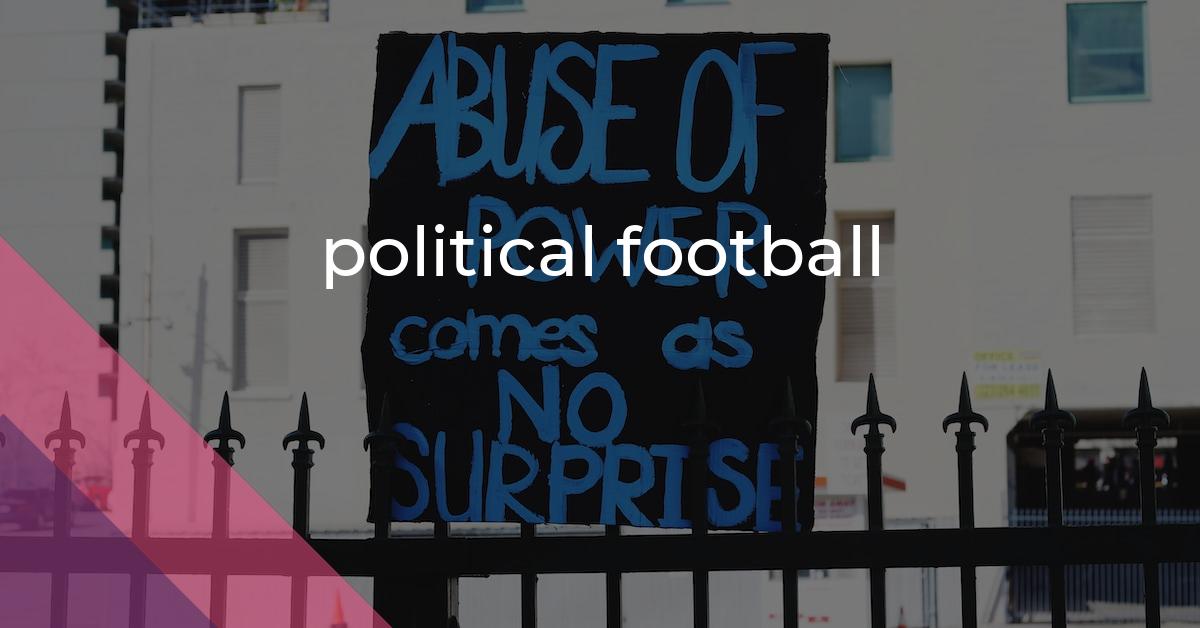political football: Idiom Meaning and Origin
What does ‘political football’ mean?
The idiom political football refers to a controversial issue or topic that is constantly debated and used by politicians to gain advantage or divert attention. It implies that the issue is being manipulated for political gain, rather than being resolved or addressed effectively.

Idiom Explorer
The idiom "roll the pitch" means to prepare or make a field or playing surface ready for a game or event to take place.
The idiom "red meat" refers to controversial or provocative topics that generate strong emotional reactions and often fuel arguments or debates.
The idiom "politically correct" refers to language, actions, or policies that are deliberately chosen to avoid offending or excluding particular groups of people, particularly those relating to gender, race, or ethnicity.
"Play to win" is an idiom that means to engage in a situation or activity with the intention of achieving victory or success, rather than just participating or going through the motions. It emphasizes the importance of being competitive and putting forth one's best effort to achieve a specific goal or outcome.
The idiom "play the race card" refers to the act of using one's race as a means to gain advantage in a situation or to deflect criticism by accusing others of racism.
The idiom "play the man and not the ball" means to focus on attacking or criticizing someone personally instead of addressing the issue at hand. It implies a diversion from the main point of the argument and resorting to personal attacks instead.
The idiom "play the gender card" means to use one's gender as a way to gain advantage or manipulate a situation, typically in an unfair or strategic manner.
"Play the ball and not the man" means to focus on the issue at hand (the ball) rather than attacking the person involved (the man).
Tracing Origins
Political football is an idiom used to describe an issue or topic that is exploited for political gain. The idiom originated from the sport of football, where it metaphorically refers to the ball being passed around and manipulated by different players. While the exact date of its first usage is unclear, it gained popularity in the 19th century and has since become a commonly used phrase.
This idiom conveys the idea that politicians treat a particular issue or topic as a game or form of entertainment instead of genuinely addressing it. They use the issue as a tool to score political points, gain support, or divert attention from other matters. In essence, the idiom implies that the individuals involved are not sincerely interested in resolving the issue but are only interested in exploiting it for their own benefit.
The idiom "play politics" is closely related to political football. It refers to the act of engaging in politics for personal gain rather than in pursuit of the common good. When politicians "play politics," they prioritize their own self-interests and manipulate situations to their advantage. This behavior aligns with the concept of political football, as both emphasize the opportunistic nature of politics.
In the realm of politics, hot-button issues such as healthcare, immigration, or gun control often become political footballs. These contentious topics are portrayed as ideological battlegrounds on which politicians wage political battles. They are consistently discussed, heavily scrutinized, and used as an opportunity to criticize opponents or rally support from their respective bases. The idiom "hot potato" is related to this phenomenon, as it describes an issue or situation that is so sensitive or controversial that nobody wants to deal with it. Similar to political football, the idiom implies that these issues are not genuinely addressed but are instead used as political tools.
Furthermore, political football extends beyond domestic politics and can be observed in international relations as well. In the realm of international politics, certain issues often become political footballs. Countries may manipulate and exploit issues such as trade disputes, territorial claims, or human rights violations for diplomatic or geopolitical advantages. By using these issues as political tools, countries aim to exert pressure, gain leverage, or deflect attention from their own internal problems. In this sense, international politics echoes the opportunistic nature of domestic politics, further highlighting the concept of political football.
Political football is an idiom that originated from the sport of football and is used to describe an issue or topic that is exploited for political gain. It emphasizes the strategic and opportunistic nature of politics, where politicians may utilize certain issues as tools to score political points or divert attention. Whether in domestic or international contexts, the idiom serves as a reminder that in the realm of politics, issues are often treated as games to be played rather than problems to be solved.
Example usage
Three examples of how the idiom "political football" can be used in a sentence are:
- The issue of tax reform has become a political football, with each party trying to score points with voters.
- Gun control has long been a political football that politicians use during campaigns but rarely take action on.
- Education funding has been tossed around like a political football, with different parties making it a topic of contention rather than finding a solution.
The idiom "political football" is often used to describe a topic or issue that politicians use to gain support or attention, without necessarily taking meaningful action or finding a solution. It implies that the issue is being passed around or manipulated for political gain, rather than being addressed in a productive manner. The term is commonly used in situations where politicians are using an issue as a means to score political points or rally their supporters, rather than genuinely aiming to resolve the problem at hand. It can also suggest that the issue is being heavily debated or argued over by different political parties, without any real progress being made.
More "Politics" idioms



